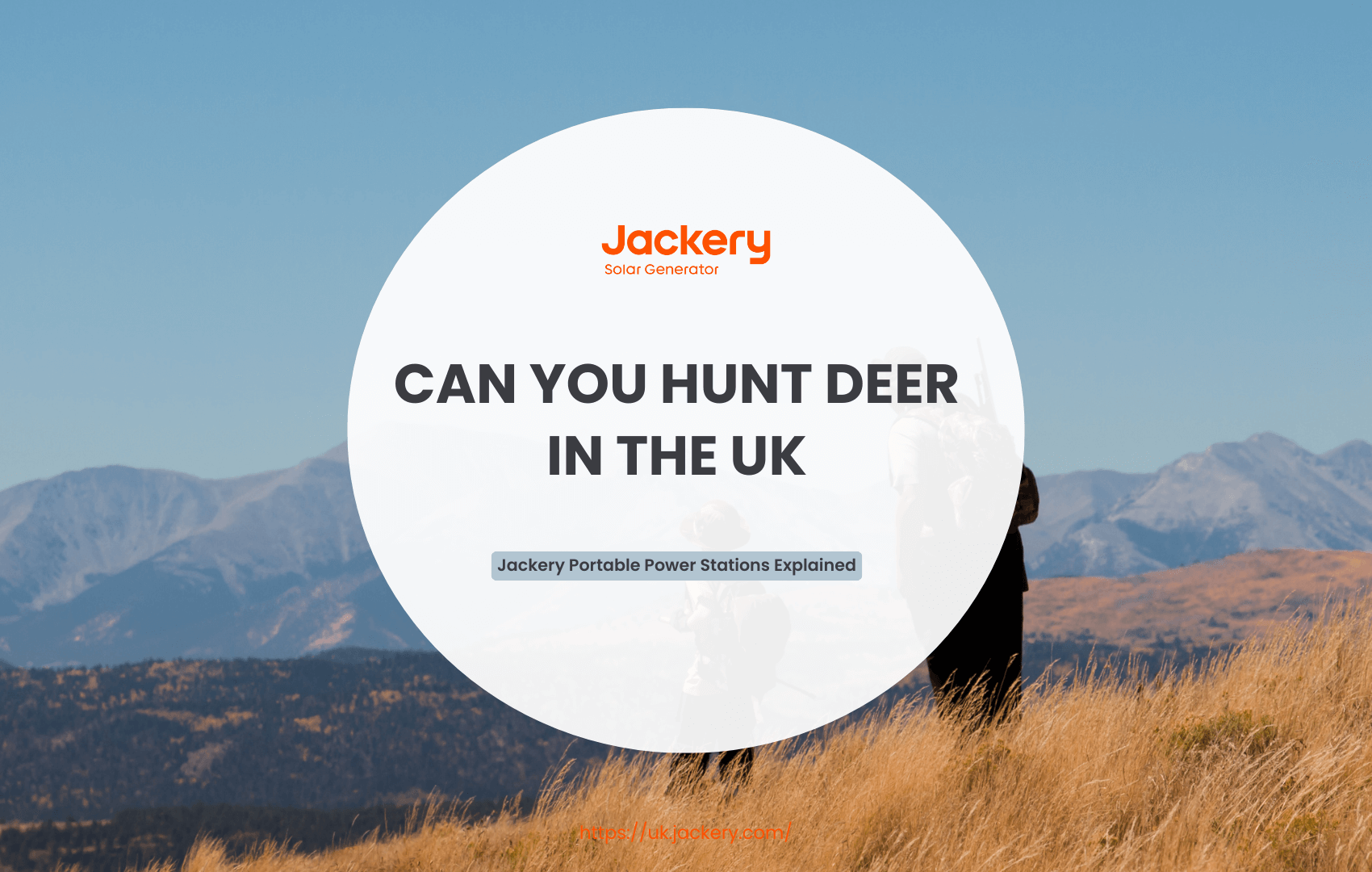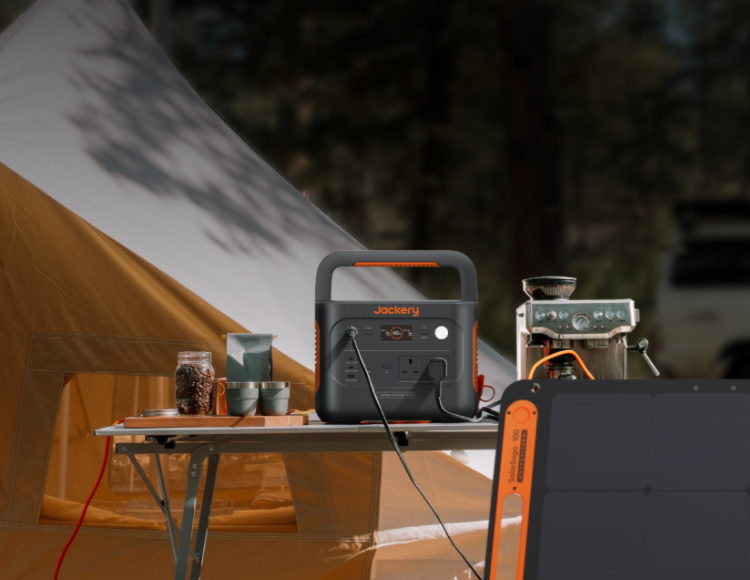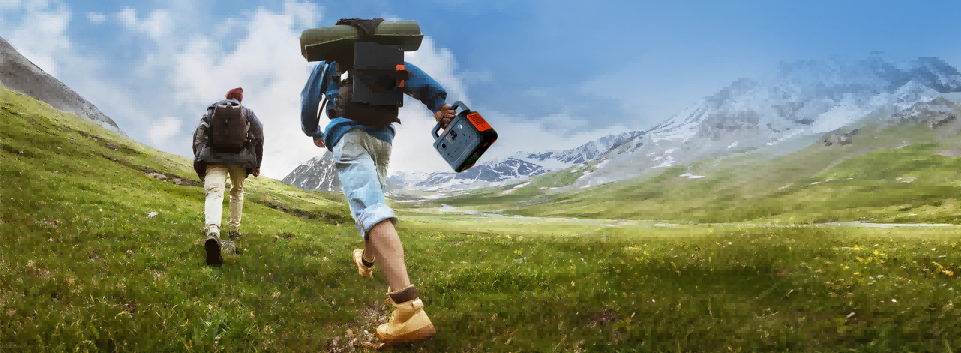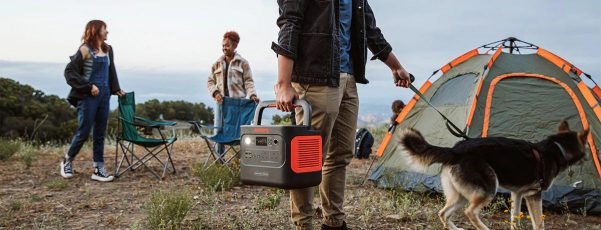Deer hunting in the UK is a long-standing ritual that is also good for the environment. People may have different ideas about hunting, but it is a highly controlled activity that helps maintain ecosystem balance and keep deer populations in check, which are now at an all-time high.
This detailed guide offers an in-depth examination of the laws governing deer hunting in the UK, including the types of deer that can be hunted, the specific times of year when hunting is permitted, and the licenses and permits required.
We'll also discuss the differences between deer hunting and deer stalking, the necessary gear, and offer some helpful advice for a safe and successful hunt. To interact with the UK's wild deer ethically, it is essential to be aware of these details.
|
Key Takeaways: |
|
● In the United Kingdom, there are six species of deer: native Red and Roe Deer; Fallow Deer (introduced during the Roman period but now considered naturalised); and invasive, non-native Sika, Reeves' Muntjac, and Water Deer. ● You can shoot deer in the UK, but there are rules and seasons that you have to follow. ● The deer open season is a legal concept specified in the Deer Act 1991 that is critical to fostering ethical deer management and conservation. ● In the United Kingdom, owning or carrying a firearm without a valid certificate is unlawful, as is using a gun without a valid certificate. ● We highly recommend the Jackery Portable Power Station, like the Explorer 500, to power your electronics and devices during your hunting trips. |
Deer Hunting in the UK Overview
There are six kinds of deer in the UK: native Red and Roe Deer; Fallow Deer (introduced during the Roman period but now considered naturalised); and invasive, non-native Sika, (Reeves') Muntjac, and Water Deer. Deer populations are at an all-time high. They are a key feature of the UK countryside, contributing significantly to the creation of balanced ecosystems.
Deer are protected by the Deer Act of 1991, which criminalises various activities such as poaching deer and the use of certain ammunition in deer hunting, as well as the Hunting Act of 2004, which prohibits hunting mammals with dogs. Still, they can currently be legally hunted under certain conditions and at certain times of the year.
Deer are still being chased and slaughtered in the southwest of England. The 'deer hunting season' is separated into three stages.
Mature stags are hunted from early August to the end of October; hinds are hunted from November to early March; and young stags are hunted in March and April.
Can You Hunt Deer in the UK?
You can hunt deer in the UK, but there are rules and seasons that you have to follow. You can shoot six types of deer: red and roe deer, which are native to the area, and fallow, sika, muntjac, and water deer, which were brought in. You can hunt during specific open seasons for each species and region, but you must obtain the necessary licenses and permissions beforehand.
Is It Legal to Shoot Deer?
The law specifies closed seasons during which no shooting is permitted, albeit they vary between England, Wales, Scotland, and Northern Ireland. Importantly, they make sure that female deer with dependent young are not killed. Muntjac is the only deer species in the UK that is not protected by a closed season, as it can breed all year. Shooting any deer at night requires a special permit.
Wherever culling is necessary, it must be done in a compassionate, efficient, and courteous manner. Public safety must receive constant consideration. Otherwise, as long as individuals performing the culling are duly authorised, have required gun licenses, and are behaving legally, they will most likely be within their rights to do so.
If you suspect unlawful conduct or a dangerous shooting, call the police at 101. Most constabularies have specialist Wildlife Crime Officers who provide additional information on their websites. If you witness armed trespass or poaching in progress, or any conduct that could endanger others, contact 999 instead. Poaching and Wildlife Crime has a BDS online page that offers advice about poaching.
Deer managers should endeavour to be as inconspicuous as possible when in the field, transporting or processing carcasses, and take all reasonable steps to work out of sight of the general public to prevent creating needless discomfort. If given the opportunity, deer managers can help educate the public about the necessity of deer management and the benefits it can provide to both deer populations and the environment.

Is It Legal to Hunt a Deer Using a Bow?
Deer hunting with any bow is forbidden in the United Kingdom. Since 1965, it has been prohibited to hunt deer with a crossbow, compound bow, or any other type of bow, whether in the wild, private deer collections, or park environments.
Its legal status remained intact under the most recent Wildlife and Countryside Act of 1981. It is, however, permitted in the majority of other countries throughout the world, including the EU, where modern bowhunting is still used as an effective method of wildlife management alongside guns.
What Are the Rules and Laws for Hunting and Shooting in the UK?
The main rules for hunting are as follows:
Every hunt must be registered with the appropriate authority (typically the local council).
Hunting can only occur between sunrise and sunset.
Dogs must be kept under careful control at all times, and only two dogs may be employed to flush out game.
No terrier work or digging is permitted. All deer must be reported to the local Deer Warden within 24 hours after their death.
In addition, specific general regulations apply to both hunting and shooting:
Every firearm must be licensed.
To protect wild birds from poisoning, several places may prohibit the use of lead ammunition.
It is forbidden to shoot from public roadways or railways.
People who are intoxicated may not use firearms or ammunition.
In Scotland, the Wildlife Acts 1967 (as amended) will primarily govern your actions; these place a greater focus on public protection from wild animals than on hunting regulations.
Illegal Hunting
Hunting is the pursuit, capture, or slaughter of any bird or animal. Not all hunting is illegal, but many laws and legal restrictions exist to protect wildlife. Illegal hunting may involve hunting outside of an open season, employing traps or weapons that cause undue suffering, or hunting without a permit.
Illegal hunting is more than just a criminal violation. You are also breaching the law by assisting in an unlawful hunt. This could involve permitting hunters to use your property or providing them with dogs for hunting.
Determining when hunting is unlawful might be difficult. Different animals and birds are protected under various pieces of legislation. If you intend to go hunting, be aware of your limitations.
|
For Hunting Deer |
|
The following actions are prohibited: ● Hunting deer on private property without permission ● Removing deer carcasses without permission, and using spears, arrows, or similar missiles as weapons or ammunition in firearms. ● Hunt deer with poisons, muscle relaxants, or medications that make them sleepy or confused. ● Hunt deer with ammunition containing stupefying medicines, poison, and muscle relaxants. ● To shoot wild deer, use traps, snares or poisoned bait during their closed season or at night, unless you have a licence or the deer is causing damage to your land( landowners can authorise someone to kill the deer if their land is being destroyed). ● Capture deer for science, education, or relocation without a specific permit. ● Open season does not protect muntjac deer. This is because Muntjac deer breed year-round. |
Deer Open Season
The deer open season is a set time when people can hunt or chase deer. These deadlines are crucial for maintaining healthy deer populations and ensuring that deer are managed fairly and equitably.
The Deer Act 1991 defines the legal term "deer open season." This is important for encouraging responsible deer management and conservation. Following the set schedules for different types of deer is not only required by law, but it is also a step towards fostering a sustainable and moral way to manage deer.
Open Season Dates For Each UK Deer Species By Sex And Location
|
Species
|
Sex
|
Open Season England, Wales & N Ireland |
Open Season Scotland |
|
Red, Sika, And Their Hybrids |
Male |
1 August – 30 April
|
No Close Season |
|
Female
|
1 November – 31 March |
21 October – 15 February |
|
|
Fallow Deer |
Male |
1 August – 30 April |
No Close Season |
|
Female |
1 November – 31 March |
21 October – 15 February |
|
|
Roe Deer |
Male |
1 April – 31 October |
No Close Season |
|
Female
|
1 November – 31 March |
21 October – 31 March |
|
|
Chinese Water Deer |
Male & Female |
1 November – 31 March |
No applicable legislation |
|
Muntjac Deer |
Male & Female |
No Close Season |
No applicable legislation |
(Data Source: BDS Deer Season)
Time Of Day
Deer are typically shot between one hour before sunrise and one hour after sunset, regardless of location in the United Kingdom.
Night shooting requires permission from one of the national governmental organisations. Before granting one, a good reason must be demonstrated: this will typically relate to public health, public safety, conservation of the natural heritage, or preventing significant property damage.
The UK's Deer Populations
The UK's deer population has reached its highest level in millennia, with an estimated two million deer living in rural and semi-urban regions. However, it's important to stress that this often-mentioned statistic is a broad estimate and not based on formal assessments. In 2020, the estimated population of farmed deer was 37,000. Since the 1970s, the deer population has increased by 450%, resulting in an estimated population of approximately two million.
More Things to Consider for Hunting Deer
Before going deer hunting in the UK, you should know what your legal and moral obligations are.

Is It Legal To Hunt Deer With Dogs?
No, the Hunting Act 2004 makes it illegal to chase deer with dogs.
However, some landowners in southwest England who desire deer culled are actively involved in the three remaining deer hunting packs. These packs take advantage of loopholes in the Hunting Act, which states that a mammal can be 'flushed' out by no more than two dogs and shot, or to relieve pain; a deer can also be slain for'research'.
Is It Legal To Use Traps And Snares To Catch Or Kill Deer?
No, it is not. Setting a trap or snare, or using poisoned or stupefying bait with the intent to injure any deer that comes into contact with it, is a criminal crime, as is using such means to take or kill a deer (or attempt to do so).
It is also forbidden to use particular firearms or ammunition listed in the Deer Act (unless the owner has provided written permission), kill a deer from a moving vehicle, or use other specific weapons and objects such as spears and arrows.
Where Can I Go Deer Hunting?
There are numerous deer hunting spots throughout England, Wales, Scotland, Northern Ireland, and the Republic of Ireland. However, deer hunting must take place on private land with the landowner's agreement, not on public ground.
How Long Does a Deer Hunt Last?
A search can last the entire morning, afternoon, or even the entire day. It is entirely up to you and your group how long a deer hunt will last; however, you should not hunt all night unless a licence is obtained.
Many people choose to stay for a few days or the weekend.
This will give you the most time to experience our beautiful natural surroundings. Hunting during the day and returning to a hotel or farm ground lodgings in the evening is an excellent way to maximise your time while still getting some rest.
United Kingdom Law on Firearms and Shotgun Certificates
In the United Kingdom, owning or carrying a firearm without a valid certificate is unlawful, as is using a gun without a valid certificate. If found guilty of these offences, you may face a fine or imprisonment.
To lawfully possess or carry a firearm in the United Kingdom, you must first obtain a firearms certificate. You can apply for a gun certificate from your local police department. A gun certificate application requires an interview, a background check, and fingerprinting. Once you have received a firearms certificate, you must renew it every five years.
To legally use a firearm in the United Kingdom, you must possess a shotgun or deer stalking certificate. You can apply for a shotgun certificate from your local police department. An interview and background check are required as part of the shotgun certificate application process. Once you have received a shotgun certificate, you must renew it every three years.
Deer Hunting vs Deer Stalking
Although they share certain similarities, deer stalking and deer hunting are two distinct activities that require different skill sets, strategies, and mindsets. Deer stalking emphasises stealth, patience, and minimising disruption to the deer, whereas hunting frequently entails pursuing the deer more actively. Both strategies have advantages and disadvantages, and personal preferences, aims, and the context often determine the optimal option.

What is Deer Stalking?
Deer stalking is one of the oldest and most fascinating activities to enjoy in the British countryside. This ancient tradition is more than just the thrill of the hunt. It's a deeply ingrained part of our cultural history that gives us a unique opportunity to interact with the environment, control animal populations, and realise how everything in our ecosystem is connected. It's more than just something to do on weekends; it's a voyage into a world where humans and nature coexist, frequently revealing surprising insights into the delicate balance.
To fully immerse yourself in the world of deer stalking, you must first comprehend the historical context and underlying goal—the concept of stalking deer dates back to our prehistoric predecessors, who relied on hunting for sustenance. Deer stalking has evolved into a regulated and highly valued field sport that is recognised as an essential component of sustainable deer management in the United Kingdom.
What's The Difference Between Deer Hunting and Deer Stalking?
While it's easy to connect deer hunting and stalking, the two are very distinct. Deer hunting is frequently associated with a fast-paced chase. However, deer stalking is a sophisticated game that requires stealth, patience, and a thorough understanding of the animal and its surroundings.
The primary goal of deer stalking is not only to kill deer, but also to observe and interact closely with them in their natural environment. This, in turn, provides an excellent opportunity for wildlife management and human development.
Deer Hunting Tips
A novice may spend five hours sitting on a hill, wondering where the deer are, but many individuals are unaware that their actions have consequences. Simply slamming your car door or talking on your phone too loudly will alert deer to your location. Through experience, you will learn to change your approach and find yourself in range of deer on a more regular basis.
We can use natural features to disguise our approach to deer. When a stag stalks, even the slightest sound might alert it. A babbling stream, for example, can reduce the sound of your footsteps in the woods. Following these methods will allow you to stalk deer and have a great deer hunting trip.
Other useful tips:
Before stalking, scout the grounds.
Stay downwind from your quarry.
Wear loose-fitting garments - quiet and waterproof.
Utilise natural elements to conceal your approach.
Wait until the weather improves.
Be patient and silent.
Essential Gear for Deer Hunting
A few essential pieces of gear are necessary for a safe and successful deer hunt in the UK. First and foremost, it's required to wear the right clothes. To blend in and stay comfortable in various weather conditions, opt for silent, waterproof, and loose-fitting clothing. You need binoculars or a spotting scope to observe deer from a distance without disturbing them.

After a successful hunt, you need a sharp, long-lasting hunting knife to field dress the deer. Of course, you need a licensed weapon and the right ammo for deer hunting to do this. Always keep a well-stocked first-aid kit with you in case of an injury. When hunting in an unfamiliar area, it's crucial to have navigation aids such as a map, compass, or GPS device.
A game sack or deer drag will be handy for getting deer home after you hunt them. A torch or headlamp is necessary for seeing, especially if the hunt takes place in the dark at dawn or twilight. Also, consider taking a portable power source, such as the Jackery Explorer 500 portable power station, to charge your essential electronics while you're out in the field.
Jackery Portable Power Station for Hunting
While "deer hunting" in the UK typically refers to deer stalking, which is a highly traditional and often low-tech pursuit focusing on tracking, stealth, and marksmanship, a Jackery Portable Power Station can still be incredibly beneficial for modern hunters.
Thermal spotters are increasingly popular in the UK for identifying deer in low-light conditions or dense cover, especially during dawn and dusk, or in thick woodland. A Jackery ensures these high-tech devices remain charged for extended periods. Similar to thermal imagers, night vision can aid in locating deer or retrieving shot animals in darkness (though shooting at night is generally illegal in the UK unless under a specific licence for pest control).
Unlike noisy gas generators, a Jackery operates silently. This is particularly crucial for deer hunting, where stealth is essential. Any noise would spook the deer.
Jackery Explorer 500
The Jackery Explorer 500 is a convenient and successful option for deer hunting in the United Kingdom, offering a significant increase in convenience and capabilities over relying solely on disposable batteries or small power banks. Its features are ideally suited to the requirements of a UK deer stalker.

Thermal Spotters and Night Vision Devices: These are increasingly common and incredibly useful for deer management in the UK, particularly for spotting deer in low-light conditions or dense cover. They are power-hungry, and the 518Wh capacity of the Explorer 500 can keep them charged for extended periods, far beyond a single night. This is crucial for early morning or late evening stalks.
GPS Devices/Handheld Sat Navs: Navigating estates, woodlands, and remote areas in the UK requires a reliable GPS device. The Explorer 500 ensures your navigation tools are always powered, preventing you from getting lost, especially in unfamiliar territory or poor visibility.
Two-Way Radios/Comms: If hunting as part of a team, two-way radios are vital for communication and safety. The Jackery keeps these charged, ensuring you maintain a constant connection.
Manageable Weight (approx. 14.1 lbs / 6.4kg): While not ultralight, it's a manageable weight for carrying from your vehicle to a high seat, larder, or temporary base camp. It's designed with a sturdy handle for easy transport. It's roughly the size of a basketball, meaning it won't take up excessive space in your vehicle or a small hide.
Silent Power: Deer are susceptible to noise. Unlike a noisy petrol generator, the Jackery Explorer 500 operates silently. This is crucial for maintaining stealth in the field and not spooking deer or other wildlife.
|
Jackery Explorer 500 Running Time |
|
|
Thermal Spotter (5W) |
28.3H |
|
Night Vision Device (5W) |
28.3H |
|
GPS Device (10W) |
21.2H |
|
Tow-Way Radio (8.4W) |
23H |
|
Portable Cooler (30W) |
10.6H |
(*The working hours are only for reference; the actual working hours depend on your usage.)
FAQs
The following are the frequently asked questions about deer hunting in the UK:
1. Where can I hunt deer in the UK?
In the UK, you can hunt deer if you hold the necessary licenses and permissions and adhere to the rules and open seasons in place. You can hunt deer on land you own or rent, or with the landowner's express consent. There are a lot of places in the UK where you can go deer stalking, usually in areas where there are both farming and woods.
2. Is it legal to shoot deer in the UK?
No, it's not usually permissible to shoot deer in the UK. The Deer Act 1991 designates deer as a protected species, and there are strict rules governing when and how they can be fired.
3. What animals can you legally hunt in the UK?
You can lawfully hunt select deer species, game birds, waterfowl, hares, and rabbits in the UK. You can also hunt certain animals, like foxes, in certain situations to keep them from hurting themselves or others. It's essential to remember that the law protects many creatures, such as badgers, bats, and otters, which can't be hunted.
4. How much does it cost to hunt deer in the UK?
Prices for guided deer stalking start at £155.00 + VAT* for a three-hour stalk expedition, which includes the cost of the outing and your guide. Those without a rifle can utilise the 'Estate Rifle' and ammunition for free.
5. Can I hunt deer on my land in the UK?
If you wish to shoot deer on your property, you must own or lease the land where the shooting will take place. If you do not own or lease the land, you must obtain formal authorisation from its owner or tenant. Additionally, you must adhere to Natural England's season and bag limits.
Final Thoughts
To successfully hunt deer in the UK, you need to have a deep understanding of the complex legal system, moral issues, and how actually to do it. Responsible involvement is crucial, encompassing adherence to strict open seasons for various types of deer, as well as obtaining the necessary licenses and permissions. The difference between deer hunting and stalking highlights the distinct ways of interacting with these creatures, emphasising the importance of being quiet, patient, and mindful of the environment.



































































































